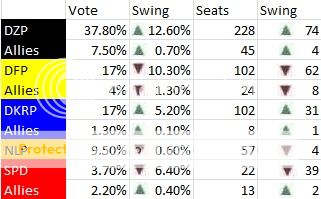The Election of 1893
With German politics growing increasingly divided between Centrist and Liberal blocks since the unification with Austrian and the Richter Chancellery 1893 was set to be a critical clash in the struggle between the two factions for political dominance.

The result was a victory for the Centre Party, although not on the same scale as the party’s 1883 electoral triumph when an absolute majority had been won. Instead the DZP fell cruelly short of a majority – despite making impressive gains the Centre faction in the Reichstag could only muster 273 seats (just 28 short of a majority). Even discounting the Socialists the other parties of the Reichstag could narrowly outnumber the Centre. The DFP were the biggest losers of the election as they lost around 1/3 of their votes – coming very close to falling behind the Conservatives. As the National Liberals largely held their share of the vote the other major losers of the election cycle were the Socialists – the SPD facing a catastrophic result, their minor gains in minority communities (particularly around Prague and in Polish communities in Silesia) failing utterly to offset the collapse in their support in German areas. Indeed, having suffered since the repeal of the Anti-Socialist Laws in working class areas the Centre was making a strong comeback – even in the notoriously radical proletarian suburbs of Berlin. Finally, the DKRP made not unimpressive gains, restoring its credentials as the third force in German politics.

In terms of its composition, the Reichstag of 1893 was not dissimilar to that of 1887 – merely with the roles of the Liberals and the Centre reversed. With Centre gains matched almost blow to blow by Liberal reverses the opposition block retained control of a little under 1/3 of the Reichstag. Just as Richter’s Liberals had been forced to pursue coalition with the Conservatives in order to maintain his government at the expense of his reform programme, the Centre had no choice but to seek a bargain with the DKRP.
As the two party leaders experiencing their first election came out of 1893 preparing for government, the Conservatives - realising their position of strength - forced significant concessions from their new coalition partners. Although they agreed to re-impose the previous level of unemployment insurance the Centre was denied support in improving healthcare provision (especially in light of their desire to do so in line with religious institutions), in the question of Austria the DKRP accepted the need for a complete withdrawal but demanded that it occur over a period of at least two years, in economics the Centre was forced to accept a tariff for all imported goods of no higher than 6% and no lower than 3%, the funds gained through the tariff were to be invested in the expansion of the military, finally the DKRP was granted joint control over the Foreign Ministry. With coalition agreements made Germany’s first South German Chancellor – Georg von Hertling – prepared to assume office.

